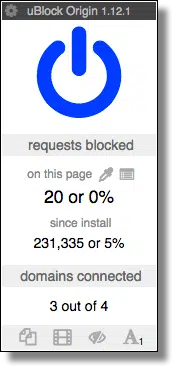Sadly, it might just be. And that means sites like Ask Leo! might die.

One of the positions I’ve held for as long as Ask Leo! has been around is that adblockers are fundamentally wrong. They prevent sites that depend on advertising from making the revenue they need to survive.
Let’s be clear about one thing up front: this isn’t about greed. This is about survival. Many useful websites exist solely because of the advertising revenue they’re able to generate. If that goes away, the sites go away. Rarely does advertising on small- and medium-sized sites cover more than the basic costs.
If you consider viewing advertisements to be the “cost” of consuming the content you want for free, then blocking those ads can be considered theft. You’re using the content without paying the price.
That’s been my position for years.
At the risk of being hypocritical, I’m changing my mind. And the advertisers have no one to blame but themselves.

Adblockers, yea or nay?
I used to be against them, but now I use one. Site usability, manipulative ads, privacy concerns, and malware risks all contributed. Online advertising is fundamentally broken, yet it remains crucial for many sites to stay afloat — including Ask Leo! If you use an adblocker, please consider supporting your favorite sites some other way.
Success is their downfall
My position to date has been that if you don’t like the advertisements on a site, then don’t visit that site. Vote with your feet. Go to another site that has less annoying ads, or pay for a site that has an option to remove ads.
There are sites with useful information that I don’t visit, reference, or point people to because the advertising on those sites is so bad.
However, voting with your feet doesn’t solve the underlying problem. Because ads are so ubiquitous, so many websites use the same ad networks, and so many ad networks use the same techniques, it’s become nearly impossible to find alternative sites that have less-annoying ads.
You can run, but you can’t hide.
Help keep it going by becoming a Patron.
Manipulation is their downfall
For many years, one of the techniques used by advertisers in the tech space was to make their ads look like download buttons. Visit a site to get the latest download of your favorite image-burning software, and you’ll see half a dozen nearly indistinguishable DOWNLOAD buttons, only one of which is the “real” download button you want. The rest? Ads.
My sense is that this has improved somewhat, but the problem remains: ads don’t always look like ads. They try to manipulate visitors into thinking the ad is part of the content. This is why it’s important to learn to recognize ads.
Manipulation also appears in another guise called “sponsored content”. This is content someone pays to place on a website.1 Sometimes it’s obvious, but often it’s indistinguishable from the site’s content. What you think is a legitimate recommendation or evaluation of a product may be an article written by that product’s creator.
In other words, it might be an ad.
Tracking is their downfall
As long-time readers know, I’m not terribly concerned about the tracking resulting in ads “following me” around the internet. But I know they concern some. To many, it feels like an invasion of privacy, and to others, it just feels creepy.
The problem, of course, is that the technique works. Ads that follow people are effective. And because they’re effective, more and more advertisers and advertising networks use the technique to sell more of whatever they’re selling. As more and more advertisers use it, more and more ads start “following” you. Even though it really is benign, the internet feels creepier and creepier.
Ask Leo! is an advertising-supported site, which means I have little control over what ads appear here. The ads that “follow” you might have nothing to do with technology or anything I’ve ever even heard of. You may see ads here for all manner of things, good or bad.
Malware is their downfall
Honestly, the final straw breaking my adblocking back is malware. It doesn’t happen often, but we’ve definitely heard of situations where an ad isn’t an ad but rather a conduit for installing malware on your machine.
This can happen for either of two reasons:
- An advertising network, or the software it uses to display ads on your machine, gets hacked into displaying malicious ads.
- An advertising network has insufficient safeguards in place, and advertisers are unintentionally allowed to display malicious ads.
The reason this concerns me is not because it’s common — it’s not — but that it’s almost completely out of our control.
I’ve long taught that you can’t get into trouble if you only visit reputable sites. But now, if that site happens to use an ad network that’s somehow compromised, that’s not true. And there’s no way to know beforehand.
I caved
As a website owner, I know adblockers are inevitable. I’ve stopped arguing against them. I don’t like them. They cost me money in lost revenue, and they make it harder for me to stay in business.
But I get it.
I know other sites — particularly news sites — get more aggressive, often showing a pop-up to visitors using an adblocker. I’ve seen a handful go so far as to block access completely if you’re using an adblocker.
How do I know this?
Because I caved and started using one.
What adblocker to use?
I wanted to be able to use Privacy Badger from the Electronic Frontier Foundation. As its name implies, it’s focused not on ad blocking but on maintaining your privacy. Its approach is heuristic, meaning it looks for website behavior that looks like tracking and blocks it. As it turns out, there’s a high degree of overlap between advertising and tracking techniques, so it functions as a relatively effective adblocker as well.
Sadly, it’s pretty close to an everything-blocker or everything-breaker. The problem is that Privacy Badger is quite aggressive, and many techniques used to detect tracking are valid for other purposes as well. For example, a technique I use here on Ask Leo! to speed up the site by using a content delivery network is detected as tracking by Privacy Badger. As a result, visiting Ask Leo! would result in a jumbled mess on your screen.
Yes, you can whitelist things, but so many sites break, and it’s such a frustrating exercise to try and figure out what to whitelist (would you know to whitelist med.askleomedia.com and img.askleomedia.com to get Ask Leo! to work?), Privacy Badger is simply a non-starter for the average computer user.
Give it a try if you like, but expect lots of things to break.

What I’ve settled on is uBlock Origin (not to be confused with uBlock). Technically, it’s not “just” an adblocker; in their words, it’s “… a wide-spectrum blocker … default behavior of uBlock Origin when newly installed is to block ads, trackers and malware sites.” It’s a browser add-on that runs quietly in the background as webpages are displayed. It’s lightweight, has a good reputation, and doesn’t break too many websites.
Unfortunately, it does break some things. But the mechanism to whitelist (or temporarily whitelist) a site in order to make it work is simple and effective. Click the uBlock Origin icon in the browser, and then click an “off” icon (shown to the right). And it’s quite configurable.
More to the point, after running it for a couple of months (in Google Chrome, but there are versions for other browsers as well) my browsing experience was not seriously impacted except for the occasional “we see you’re using an adblocker” message. Rarely did I need to whitelist a site I was visiting, and that was easy and quick.
Where do we go from here?
Internet advertising is broken.
Between sites plastered with ads, the perception of privacy issues, misleading and manipulative advertisements, and the risk — however small — of malware, it’s hard to say anything else.
Advertising has enabled the varied and rich experience that is the internet today. Without ads, a significant number of the sites you rely on daily — perhaps even most of them, including Ask Leo! — wouldn’t exist.
As a website owner, I have to be pragmatic to keep my site and service afloat. Ads allowed Ask Leo! to come into being, and ads in some form will certainly be here for some time to come.
At the same time, I’m not taking any draconian actions against those who choose to use adblockers — I get it, I really do. In my case, I simply explore other ways to pay the bills, like product sales and patronage.
As an internet user, I’ve become much less averse to financially supporting the sites and services I use that give me value. Be it subscriptions, purchases, or patronage, I believe it’s important to put my money where my mouth is. If advertising is broken — and it is — then these same sites and services are almost certainly dealing with the same kinds of issues I am.
I know how the sausage is made, and it takes money to turn the crank.
Do this
Go ahead. Use an adblocker if you feel you must. But please consider supporting the sites and services you use regularly somehow. Without that support, they may cease to exist.
One way to support Ask Leo! that’s completely free is to subscribe to Confident Computing! Less frustration and more confidence, solutions, answers, and tips in your inbox every week.
Footnotes & References
1: Something I’ve never allowed on Ask Leo! and have no plans to start. Yet I get solicited nearly every day.


I very frequently watch your videos and gain much from their content and your expertise. I would like to provide a small PayPal contribution, but only on a one-time basis (probably now and again). Your donation provisions seem to allow only for programmed periodic contributions, which I cannot do for several reasons. Am I missing something? Can you provide me a link to make one-time PayPal donations to your AskLeo site?
Here is a web page to make a one-time contribution to Ask Leo!
Buy Leo a Latte